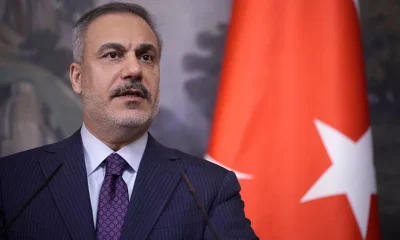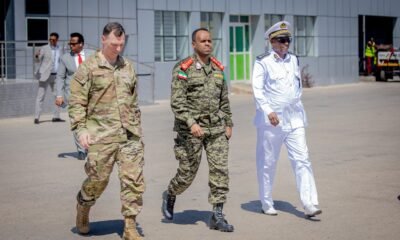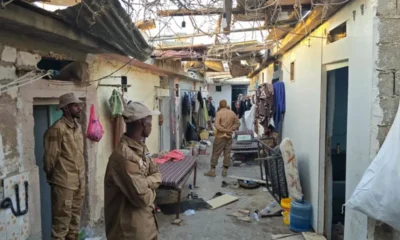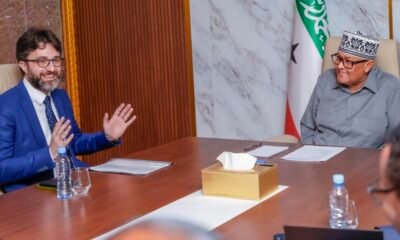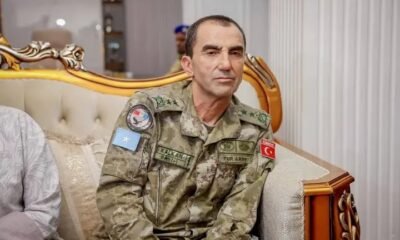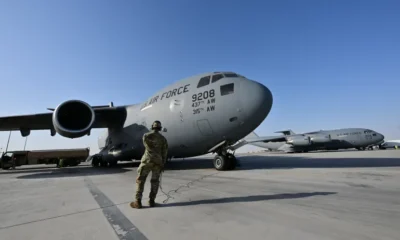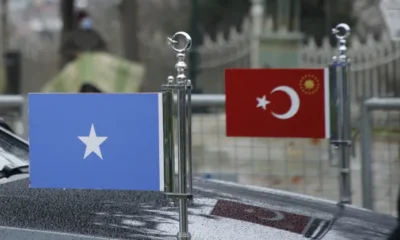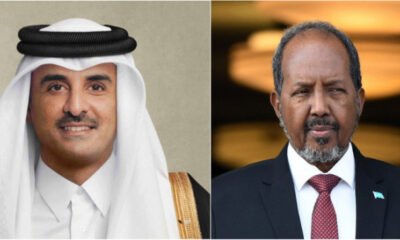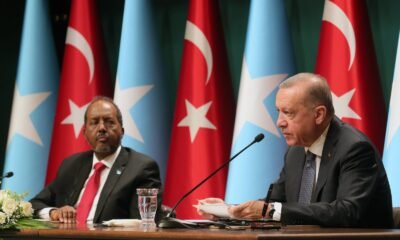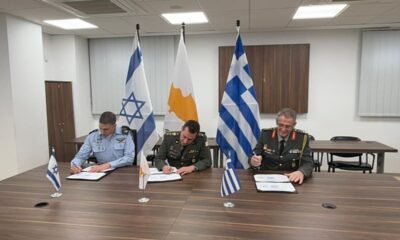Diplomacy
Turkey’s Spy Chief Ventures into Libya’s Turbulent Crisis

Amid a perilous political standoff, Turkey’s top spy navigates the chaos in Libya, where oil exports have ground to a halt and stability hangs by a thread.
Turkey’s top spy chief, Ibrahim Kalin, has plunged into the heart of Libya’s escalating crisis. Kalin, the head of Turkey’s National Intelligence Agency (MIT), landed in Tripoli amid a political maelstrom that has effectively choked Libya’s oil exports, plunging the nation into an unprecedented state of turmoil.
On a recent visit, Kalin met with Prime Minister Abdulhamid al-Dbeibah and other key Libyan officials. This encounter marks the highest-level contact between Ankara and Tripoli since Dbeibah’s visit to Turkey just a few months ago. Libya, which has barely managed a semblance of stability over the past four years, now finds itself on the brink of chaos.
The immediate cause of the crisis? The sudden and contentious dismissal of Sadiq al-Kabir, Libya’s veteran central bank chief. Kabir’s removal has ignited a fierce political standoff. Eastern factions, loyal to renegade commander Khalifa Haftar, have responded by imposing a complete shutdown on Libya’s oil production—a move that not only halts the flow of the country’s lifeblood but also threatens to dismantle the fragile stability that has held the country together since 2011.
Turkey, which intervened militarily in Libya in 2020 to bolster Dbeibah’s government against Haftar’s forces, is now playing a crucial role in attempts to navigate this complex and volatile situation. Kalin’s visit is more than a mere diplomatic gesture; it is a critical part of Ankara’s effort to restore balance and ensure that Libya’s path to resolution is paved with national agreement and de-confliction.
Kalin’s mission underscores Turkey’s deep stakes in Libyan affairs. Ankara’s commitment to Libya’s unity and stability is not just rhetoric but a strategic imperative, given its substantial investment and military involvement in the country. The disruption of oil exports threatens not only Libya’s economy but also jeopardizes Turkey’s interests and the broader regional balance.
As rival Libyan authorities struggle to address the political impasse and restore oil production, the fate of Libya’s stability hangs in the balance. Kalin’s visit highlights the intricate web of alliances and rivalries that define Libya’s current crisis, making it a focal point of international intrigue and high-stakes diplomacy.
In a landscape where political maneuvering can make or break nations, Kalin’s diplomatic journey into the heart of Libya’s turmoil is a vivid illustration of the high-octane diplomacy at play. The world watches as Libya’s fragile peace is tested and Turkey’s role as a key player in the crisis becomes ever more pivotal.
Diplomacy
Abiy Links Renewable Energy Drive to Horn of Africa Integration
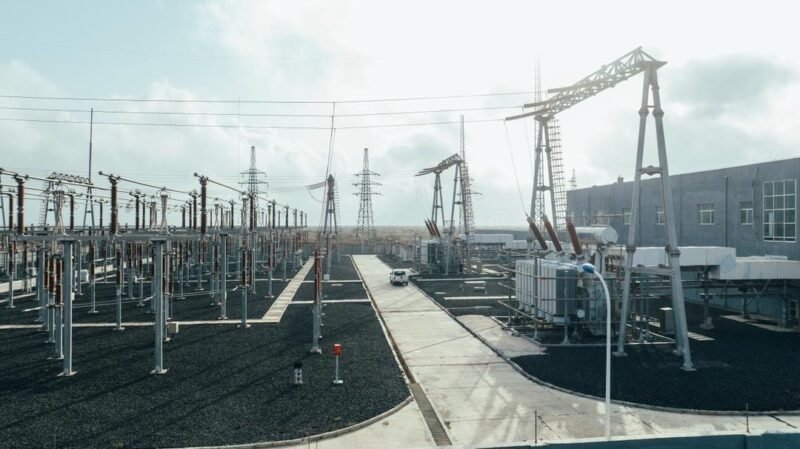
Ethiopia Frames Clean Energy Push as Regional Project, Linking Power Growth to Cross-Border Integration.
Ethiopia is no longer presenting clean energy as a domestic development project. It is framing it as a regional system, one that binds neighbors together through power lines, shared infrastructure, and economic interdependence.
Prime Minister Abiy Ahmed’s remarks at the inauguration of the Aysha II Wind Power Project made that strategy explicit. Standing alongside Djibouti’s President Ismail Omar Guelleh and Somalia’s President Hassan Sheikh Mohamud, Abiy cast Ethiopia’s renewable energy drive as inseparable from cross-border connectivity and regional cooperation.
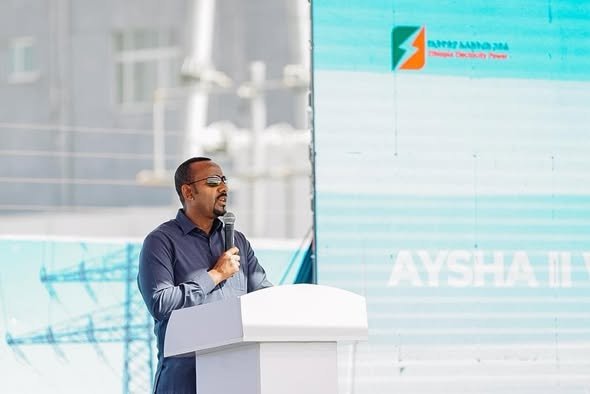
Prime Minister Abiy Ahmed
The symbolism of the location mattered. Aysha II sits in Ethiopia’s Somali Region, a peripheral area historically associated with marginalization rather than national transformation. By placing a major wind project there, Addis Ababa is signaling that its energy transition is also a political project—one aimed at integrating border regions into national and regional economic systems.
With a total planned capacity of 120 megawatts and 80 megawatts already feeding the national grid, Aysha II is modest compared with hydropower giants like the Grand Ethiopian Renaissance Dam. But its strategic value lies elsewhere. Wind power diversifies Ethiopia’s energy mix, reduces dependence on rainfall-dependent hydropower, and supports a narrative of climate-aligned growth that resonates with international partners.
Abiy’s repeated emphasis on regional integration reflects a deeper calculation. Ethiopia’s economic ambitions exceed what its domestic market alone can absorb. Power exports to Djibouti already generate revenue and political leverage. Expanding energy and transport links with Somalia and South Sudan would extend that influence, turning Ethiopia into a regional energy hub rather than just a large consumer.
The reference to the GERD reinforces this framing. By portraying the dam as an African achievement built with domestic resources, Abiy is positioning Ethiopia as proof that large-scale clean energy projects can be delivered without external dependency. At the same time, the dam remains a reminder that energy projects in the Horn are never purely technical. They reshape regional politics, provoke disputes, and redefine power relations.
This is why Abiy pairs energy with diplomacy. Cooperation with Djibouti on power, water and infrastructure offers a model of pragmatic integration. Engagement with Somalia carries higher political risk but also higher strategic payoff, especially as Addis Ababa seeks diversified access routes and economic corridors in a volatile region.
Hosting the upcoming COP-32 Summit adds another layer. Ethiopia intends to use the platform to present itself as a continental leader on climate and development, leveraging its renewable portfolio to attract financing, legitimacy and partnerships. Clean energy becomes both a development tool and a diplomatic asset.
The broader message is clear. Ethiopia is betting that shared infrastructure can stabilize relationships in a region marked by conflict and mistrust. Power lines, in this vision, are not just conduits for electricity but for influence and interdependence.
Whether that bet pays off will depend on political realities beyond turbines and grids. Regional tensions, internal conflicts, and competing ambitions could just as easily turn energy into a new fault line. For now, Addis Ababa is pushing a confident narrative: that East Africa’s future will be cleaner, more connected, and more integrated—and that Ethiopia intends to sit at the center of it.
Diplomacy
Trump Threatens 200% Tariffs on French Wine After Paris Rejects ‘Board of Peace’
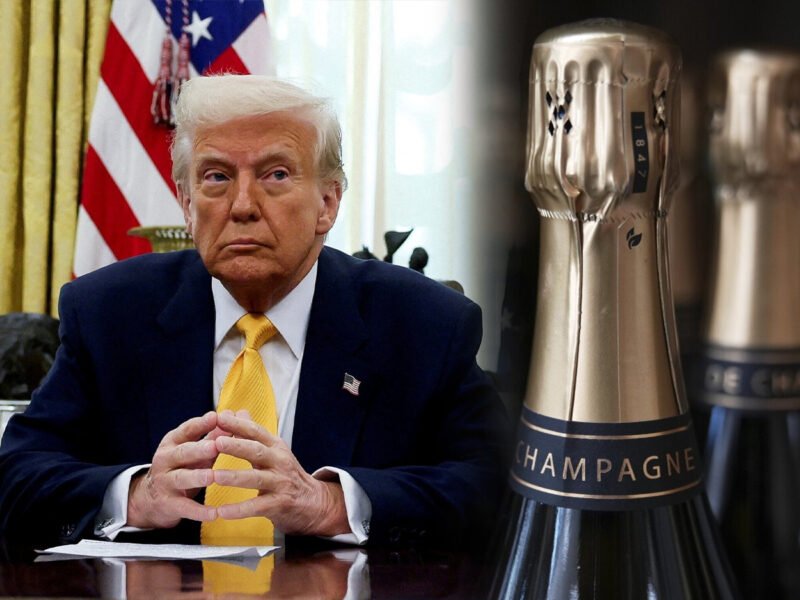
From Gaza to Greenland, Trump turns tariffs into leverage—and Europe into the test case.
U.S. President Donald Trump has escalated his trade-as-coercion strategy, threatening a 200% tariff on French wine and champagne after France signaled it would not join his proposed international “Board of Peace.”
The threat came after an aide to French President Emmanuel Macron said Paris “does not intend” to accept an invitation to the board, an initiative Trump first floated last September as part of a plan to end the Gaza war but has since expanded into a loose framework for mediating global conflicts.
“Nobody wants him because he’s going to be out of office very soon,” Trump said when told of Macron’s likely refusal. “I’ll put a 200% tariff on his wines and champagnes and he’ll join—but he doesn’t have to join.”
Macron’s term runs until May 2027, and French officials have so far dismissed Trump’s remarks as political theater. But the threat underscores a broader shift: tariffs are no longer just economic tools in Trump’s playbook—they are instruments of diplomatic pressure.
According to a draft charter seen by Reuters, countries invited to the Board of Peace would be expected to contribute $1 billion in cash to secure membership beyond three years. The document proposes Trump as the board’s inaugural chairman, with authority over membership decisions. Invitations reportedly went out to a wide—and controversial—list of leaders, including Vladimir Putin, UK Prime Minister Keir Starmer, Belarusian leader Alexander Lukashenko, and Indian Prime Minister Narendra Modi.
Critics warn the board could undermine the United Nations by creating a parallel, pay-to-participate forum with unclear mandates and opaque decision-making. The publication by Trump of a private text exchange with Macron—shared on Truth Social—has only deepened concerns about the initiative’s seriousness and intent.
The dispute also folds into a wider transatlantic clash. Washington has already warned that eight European countries—Denmark, Norway, Sweden, France, Germany, the UK, the Netherlands, and Finland—could face 10% tariffs from February unless they support U.S. efforts to acquire Greenland, a move Europe has rejected as a violation of Danish sovereignty.
EU officials are weighing retaliatory options, including tariffs on €93 billion worth of U.S. goods and the activation of the bloc’s anti-coercion instrument, designed to counter economic pressure used to force policy change.
“I don’t think they’re going to push back too much,” Trump said of Europe. “We have to have it… They can’t protect it.”
For Europe, the pattern is becoming unmistakable: sovereignty disputes, security alliances, and economic penalties are being braided together. For Washington, the message is equally clear—participation is optional, but resistance may come at a steep price.
Diplomacy
Ethiopia–Israel Axis Strengthens as Regional Stakes Rise
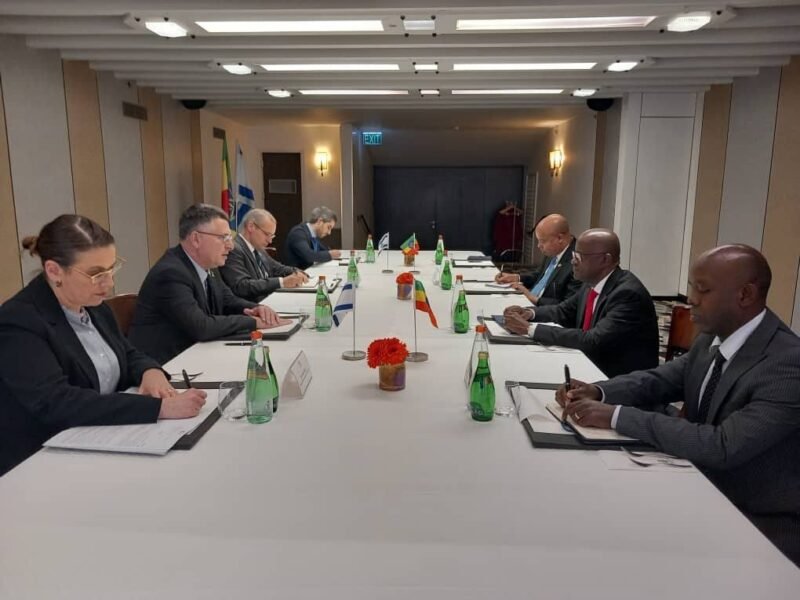
Ethiopia and Israel Reaffirm Strong Ties Ahead of Fourth Political Consultation in Jerusalem.
Ethiopia and Israel are moving to consolidate a quietly resilient partnership at a moment of heightened geopolitical flux in the Horn of Africa and the Middle East. Talks this week between Ethiopia’s State Minister for Foreign Affairs, Ambassador Hadera Abera, and Israeli Foreign Minister Gideon Sa’ar signal continuity — and strategic intent — ahead of the fourth Ethio–Israel Political Consultation set to take place in Jerusalem.
The discussions focused on deepening bilateral cooperation, with particular emphasis on economic ties, while also addressing regional and multilateral issues of shared concern.
For Addis Ababa, the engagement reinforces its long-standing diplomatic balance: maintaining Western, Middle Eastern, and emerging partnerships as it navigates post-conflict recovery and regional competition.
For Israel, Ethiopia remains a pivotal African partner — politically influential, demographically significant, and strategically located near the Red Sea corridor.
The timing matters. With shifting alliances in the Horn, rising Red Sea security tensions, and Israel expanding its diplomatic footprint in Africa, the reaffirmation of ties with Ethiopia reflects a broader effort to anchor stability through pragmatic cooperation rather than ideology.
What stands out is consistency. While the region experiences rapid realignments, Addis Ababa and Jerusalem are signaling that their relationship is institutionalized, forward-looking, and insulated from short-term turbulence.
The upcoming political consultation in Jerusalem is expected to translate diplomatic warmth into concrete economic and strategic initiatives.
In a region defined by uncertainty, Ethiopia and Israel are betting on continuity — and on each other.
Diplomacy
Somaliland Recalls Ambassador to Djibouti as Post-Recognition Tensions Escalate

Somaliland Pulls Envoy From Djibouti After Israel Recognition.
The Republic of Somaliland has formally recalled its ambassador to Djibouti for consultations, signaling a sharp escalation in diplomatic tensions following Israel’s recognition of Somaliland as a sovereign state.
In an official statement released Wednesday, the Ministry of Foreign Affairs and International Cooperation confirmed that Somaliland’s representative to Djibouti has returned to Hargeisa “as part of ongoing diplomatic engagements and in line with established diplomatic practice.”
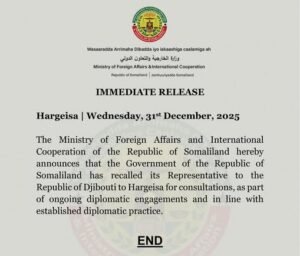
Officials separately confirmed that Djibouti’s ambassador to Somaliland also departed Hargeisa on Wednesday morning for Djibouti, indicating that both governments have summoned their envoys simultaneously—a classic diplomatic signal of protest short of cutting ties.
Regional analysts say the move is directly linked to Djibouti’s public opposition to Somaliland’s growing international recognition, particularly after Israel became the first UN member state to formally recognize Somaliland’s independence.
“This is a calibrated warning shot,” one regional diplomat said. “Recalling ambassadors for consultations is how states signal deep dissatisfaction without crossing into full diplomatic rupture.”
Djibouti has positioned itself firmly against Somaliland’s recognition drive, aligning with Somalia and other regional actors resisting changes to the Horn of Africa’s political map. That stance has increasingly strained relations between the two neighbors, especially as Somaliland gains new strategic relevance along the Gulf of Aden and Red Sea corridor.
The dual recalls underscore how Israel’s recognition has triggered real-world diplomatic consequences across the Horn, reshaping alliances and forcing regional capitals to choose sides.
For now, channels remain open. But the message from Hargeisa is unmistakable:
Somaliland is no longer absorbing opposition quietly—and it expects its sovereignty to be treated as a political reality, not a theoretical debate.
Diplomacy
Ambassador Masoud Ali Powers Historic UAE Economic Breakthrough

Ambassador Masoud Ali’s strategic diplomatic initiatives in the UAE position Somaliland for unprecedented economic growth and global recognition under President Irro’s visionary leadership.

In the intricate tapestry of international diplomacy, moments of strategic brilliance often illuminate a nation’s path toward greater recognition and prosperity. Such a moment has recently unfolded for Somaliland, epitomized by the exemplary work of its Ambassador to the United Arab Emirates, Masoud Ali, and the visionary leadership of President Abdirahman Mohamed Abdullahi Irro.
The recent high-level working trip by Somaliland’s Minister of Energy and Minerals, Eng. Ahmed Jamac Barre, to the UAE, meticulously orchestrated by Ambassador Ali, stands as a powerful testament to Somaliland’s readiness to engage with global markets and its significant diplomatic progress.

This visit was far more than a routine official engagement; it was a carefully calibrated demonstration of Somaliland’s economic potential on the world stage. Ambassador Masoud Ali’s instrumental role in facilitating the Minister’s meetings with major companies and international investors in Dubai, Abu Dhabi, and Sharjah cannot be overstated. His deep understanding of the UAE’s business landscape and his ability to forge connections with influential entities like Mubadala, BB Energy, Skyline, Masdar, and Tech City, all renowned for their expertise in oil, gas, and renewable energy, highlight a diplomatic acumen that sets a high bar for all Somaliland’s representatives abroad.
Ambassador Ali’s proactive approach and strategic foresight are a shining example for junior Somaliland ambassadors across the globe, demonstrating how dedicated and knowledgeable diplomatic efforts can directly translate into tangible economic opportunities for the nation.

The choice of the UAE as a destination was itself a strategic masterstroke, reflecting a long-term vision to tap into one of the world’s major business and investment hubs. It signals that Somaliland is consciously seeking financial and technical support from influential countries, moving beyond traditional aid paradigms towards robust economic partnerships.
During these crucial engagements, the Minister of Energy and Minerals presented a compelling case for investment, anchored in Somaliland’s enduring peace, stability, and security since regaining its independence in 1991. He underscored the nation’s proven democratic credentials, evidenced by free elections and peaceful transfers of power, which offer a stark contrast to the volatility often associated with the broader region.
Furthermore, the Minister highlighted Somaliland’s open economic market, attractive investment incentives, and its abundant natural resources. Crucially, he emphasized Somaliland’s strategic geographical location, adjacent to the lucrative Gulf markets, and the transformative development of the Berbera port and the Berbera Corridor road, which are rapidly solidifying its position as a vital regional trade hub.
The transparent presentation of “oil blocks” ready for investment, alongside the Ministry’s commitment to officially regulate the oil and gas sectors while safeguarding national rights, instilled a vital sense of confidence in potential investors.
This successful diplomatic and economic outreach is a direct reflection of President Abdirahman Mohamed Abdullahi Irro’s astute leadership. His administration, characterized by its commitment to action and unity, has clearly prioritized economic growth and the pursuit of full international recognition through pragmatic engagement.
The appointment of Ambassador Masoud Ali to such a critical diplomatic post in the UAE exemplifies President Irro’s judicious ability to place the right person in the right position, leveraging individual expertise for national gain.
This discerning approach inspires confidence that as President Irro prepares to appoint new ambassadors globally, he will continue to select individuals of similar caliber and strategic vision, further strengthening Somaliland’s diplomatic corps and accelerating its journey towards greater international standing and economic self-reliance.
The success in the UAE is not just a win for the energy sector; it is a powerful narrative of a nation confidently stepping onto the global economic stage, guided by effective diplomacy and visionary leadership.
Diplomacy
Ethiopia Eyes Asian Leverage with Vietnam Alliance

From textiles to coffee diplomacy, Abiy Ahmed courts Vietnam to position Ethiopia as Africa’s rising industrial giant.
Prime Minister Abiy Ahmed’s state visit to Vietnam is not just another diplomatic handshake — it’s a strategic recalibration of Ethiopia’s foreign policy with serious implications for Africa’s economic future. Ambassador Dessie Dalke’s post-visit briefing confirms what insiders are calling Abiy’s Hanoi Gambit: a bold move to tie Ethiopia’s industrial ambitions to Vietnam’s meteoric economic trajectory.
This partnership isn’t about nostalgia for South-South solidarity. It’s about exchanging blueprints for industrial takeoff. Vietnam’s transformation into a manufacturing and export powerhouse — particularly in textiles, footwear, and agri-processing — is precisely the model Ethiopia is desperately trying to emulate under Abiy’s prosperity agenda. Addis Ababa is betting that Vietnam can help plug the knowledge and capacity gaps that have plagued Ethiopia’s ambitions.
But the heart of this alliance lies in coffee diplomacy. Ethiopia and Vietnam rank third and second globally in coffee production, yet Vietnam’s value chain is light years ahead in branding, export sophistication, and global market access. The promise to collaborate on coffee sector development could be a game-changer for Ethiopia’s struggling exporters.
Beyond economics, Abiy’s visit plays into a broader geo-strategic narrative. With Ethiopia pivoting toward Asia, this move signals Addis Ababa’s intent to reduce dependence on Western donors and assert its relevance in a multipolar world. Vietnam, too, gains: a foothold in Africa’s second-most populous country and access to untapped markets.
Crucially, Ambassador Dessie framed Ethiopia and Vietnam as “continental gateways” — Ethiopia to Africa and Vietnam to Asia. That framing isn’t just poetic—it’s geopolitical. As the West retreats and China recalibrates, this emerging Africa-Asia axis could redefine trade corridors and south-south cooperation.
The next step? Implementation. The planned ministerial-level mechanism to track bilateral deals will determine whether this visit marks the dawn of a new era or fades into the fog of diplomatic platitudes. If Abiy gets it right, Vietnam may become Ethiopia’s Singapore dream realized — and Africa’s development model may just get a new eastern playbook.
Analysis
What Irro’s UAE Trips Could Mean | The Irro-UAE Axis
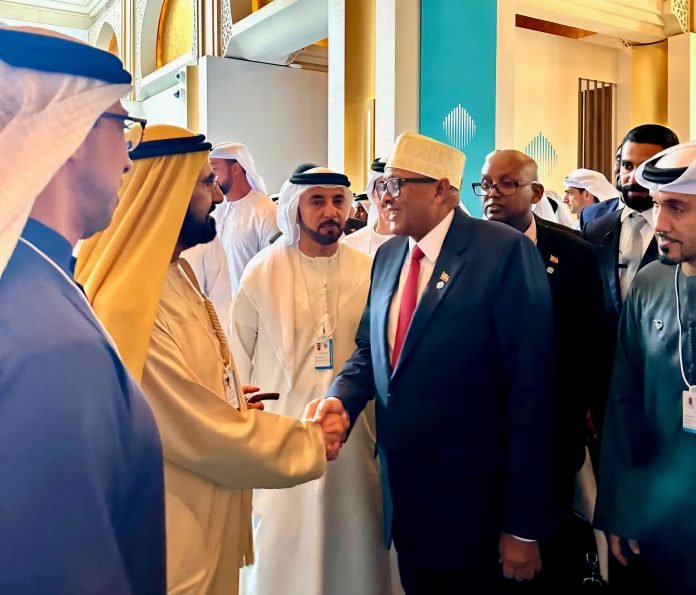
Why Is President Irro Flying to the UAE Again? Whispers of Recognition, Billion-Dollar Deals, and a Storm Brewing in Berbera.
In just under 100 days, Somaliland’s President Abdirahman Mohamed Abdullahi Irro is heading to the United Arab Emirates for the third time. That’s not just frequent travel—it’s unprecedented. What’s driving these urgent, tightly coordinated visits to Abu Dhabi? Why is the Minister of Foreign Affairs absent from the entourage, replaced by presidential aides and a deepening cloud of silence?
A senior diplomatic source, speaking on condition of anonymity, described the UAE visits as “recognition choreography”—a final act in a diplomatic ballet being orchestrated quietly behind closed doors.
“What you’re seeing isn’t normal protocol,” the source said. “This is high-stakes geopolitical engineering. What’s being prepared now will change the future of Somaliland forever.”
Is Recognition on the Table—via Dubai?
For months, rumors have swirled in foreign policy circles that the United States may recognize Somaliland—but not directly. Instead, the Emiratis are being positioned as brokers, offering a politically ‘neutral’ channel for what could be the most significant diplomatic announcement since Somaliland declared back its 1960 independence in 1991.
“Dubai is the middleman. Recognition won’t come with fireworks—it’ll come through handshakes in quiet halls and business corridors,” a Gulf intelligence analyst told WARYATV. “Washington prefers deniability. Abu Dhabi delivers the message.”
Indeed, Irro’s persistent presence in the UAE—paired with deepening Emirati involvement in Berbera’s port, airport, military infrastructure, and now digital infrastructure—suggests a comprehensive state-to-state alignment is being quietly cemented. And it doesn’t end there.
Berbera: The Crown Jewel Everyone Wants
The Berbera corridor has become a magnet for global powers. As the UAE upgrades the airport into a logistics and military hub, the United States is allegedly exploring a forward operating base there.
Is this why Turkey suddenly reappeared in Hargeisa after years of silence?
“Everyone knows Berbera is the new Gibraltar,” a regional security analyst said. “It controls the chokepoint between Africa and the Gulf. Whoever controls it owns tomorrow’s trade.”
Some speculate that Microsoft’s G42-backed data center in Berbera is not just about cloud computing—but part of a strategic backdoor for U.S. tech expansion, bypassing Chinese chip restrictions. If true, Somaliland has already become a digital battlefield in a 21st-century great power game.
The Ethiopia MOU—About to Become a Treaty?
President Irro’s UAE visits also come amid sudden silence from Addis Ababa on the controversial MOU between Ethiopia and Somaliland. Could this silence mean negotiations have resumed—this time, with Emirati mediation?
Whispers in the diplomatic grapevine suggest a trilateral arrangement is on the table: Ethiopia gets maritime access, Somaliland gets recognition—and the UAE gets everything in between.
If true, this is no longer just diplomacy—it’s statecraft with billion-dollar stakes.
What About Gaza? Are Refugees a Bargaining Chip?
In a stunning twist, some foreign observers point to recent private discussions in Abu Dhabi regarding the relocation of Gaza refugees to parts of East Africa. Somaliland’s name has appeared in these closed-door talks.
“It’s a long shot,” said one insider. “But if Somaliland offered temporary humanitarian corridors or resettlement zones, the geopolitical goodwill would be enormous—especially with Washington and Tel Aviv.
Could this be part of a larger pact? Offer land. Gain recognition. Cash in diplomatic credit.
Unverified reports suggest billions in UAE development funds—for roads, desalination, and defense—are tied to this very framework. One leaked document references $3.1 billion in planned Emirati investments in Somaliland if “status normalization” is achieved.
Emotion and Uncertainty Collide
Somalilanders are left asking: Is our president securing our rightful seat among nations, or is he walking into a deal made in smoke-filled rooms? Is this the final chapter of a three-decade recognition struggle—or merely another mirage of sovereignty?
There’s awe at the possibility, anger at the secrecy, and joy at even the whiff of recognition. Yet there’s also fear.
“We are playing with giants,” one Hargeisa academic warned. “In this game, the small players can be eaten—or they can be crowned. It depends on the strength of their leader.”
Whatever Irro is doing in Dubai, it’s no ordinary state visit. The stakes are existential. The silence is deafening. The outcome? Possibly world-shifting.
Somaliland is no longer just a forgotten corner of the Horn—it is now a chessboard of global ambition. All eyes are on the skies over Berbera, waiting for the next plane to land—and the next headline to break.
Analysis
U.S. Target Chinese Students Over Espionage Fears, Sparking Diplomatic Backlash

Congressional panel demands data from universities as Beijing warns against violating rights of Chinese nationals studying in the U.S.
Tensions between Washington and Beijing have flared again, this time over Chinese students studying at U.S. universities. A congressional panel led by the House Select Committee on the Chinese Communist Party has formally requested data from six leading American institutions—Carnegie Mellon, Stanford, Purdue, USC, and others—regarding Chinese nationals in STEM fields. The panel alleges that these students may be embedded by Beijing to illicitly access sensitive research and advanced technologies.
The request, issued by committee chair Rep. John Moolenaar, reflects a growing wave of suspicion in Washington about the role of foreign students in U.S. research infrastructure. He described the current environment as a “dangerous crossroads,” where financial dependence on international tuition may be compromising national security. He further warned that academic campuses serve as “soft targets” for espionage, with the student visa system acting as a “Trojan Horse for Beijing.”
The accusations, while not new, signal an intensifying political push to scrutinize Chinese students and researchers more broadly. Lawmakers argue that Chinese nationals in U.S. programs tied to cutting-edge innovation—particularly in artificial intelligence, semiconductors, aerospace, and quantum computing—may be exploited by Beijing for strategic advantage.
Requests from the committee include data on research topics, funding sources, and institutional safeguards to prevent unauthorized access to federally funded projects. The implication is clear: lawmakers believe U.S. universities may be unwittingly contributing to China’s technological rise, particularly in areas with dual-use military potential.
However, this hardline stance has sparked significant backlash. Critics argue that sweeping generalizations about Chinese students risk veering into racial profiling and could undermine the very scientific openness that drives American innovation. Universities rely heavily on international students, especially from China, both for tuition and for their contributions to research and development.
Beijing was quick to condemn the move. Chinese Foreign Ministry spokesperson Mao Ning urged the U.S. to “stop overstretching the concept of national security” and to uphold the rights of Chinese students abroad. She emphasized that Chinese nationals make up roughly 25% of the international student population in the U.S. and contribute meaningfully to economic and technological advancement.
The latest controversy arrives amid an already fragile U.S.-China relationship, with disputes ranging from trade and technology to military posture in the Indo-Pacific. Beijing views the escalating rhetoric against its students as part of a broader campaign to contain China’s rise by restricting access to knowledge and collaboration.
Adding fuel to the fire, Republican Rep. Riley Moore introduced the “Stop CCP Visas Act”, which proposes banning Chinese citizens from studying or participating in exchange programs in the U.S. While the bill is unlikely to pass, it has generated alarm among civil rights groups and educators, who draw parallels to the Chinese Exclusion Act of 1882—a now-defunct law that restricted Chinese immigration for over 60 years.
The proposal has been met with strong resistance, not only from Democrats but also from within the higher education sector, which warns of long-term harm to America’s reputation as a global hub for academic excellence.
This clash over Chinese students encapsulates a broader dilemma in U.S.-China relations: how to safeguard national security without undermining openness and academic collaboration. While lawmakers raise valid concerns about espionage and intellectual property theft, targeting students en masse risks harming diplomatic relations, educational institutions, and America’s own innovation ecosystem.
At a time when global collaboration is vital to address challenges from climate change to pandemics, narrowing educational channels may prove counterproductive. How Washington navigates this balance will shape not only its scientific leadership but also the character of its global partnerships.
-

 Analysis11 months ago
Analysis11 months agoSaudi Arabia’s Billion-Dollar Bid for Eritrea’s Assab Port
-

 Interagency Assessment2 months ago
Interagency Assessment2 months agoTOP SECRET SHIFT: U.S. MILITARY ORDERED INTO SOMALILAND BY LAW
-
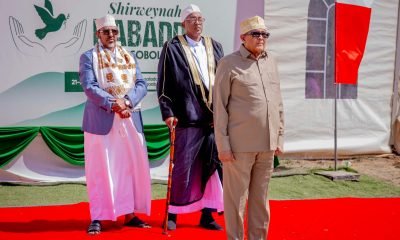
 Somaliland3 months ago
Somaliland3 months agoSomaliland Recognition: US, UK, Israel, and Gulf Bloc Poised for Historic Shift
-

 EDITORIAL1 year ago
EDITORIAL1 year agoDr. Edna Adan Champions the Evolving Partnership Between Somaliland and Ethiopia
-
Top stories2 years ago
Ireland, Norway and Spain to recognize Palestinian state
-

 Russia-Ukraine War6 months ago
Russia-Ukraine War6 months agoFibre-Optic Drones Shift Ukraine’s Drone Warfare
-

 ASSESSMENTS10 months ago
ASSESSMENTS10 months agoOperation Geel Exposes the Truth: International Community’s Reluctance to Embrace Somaliland as a Strategic Ally
-
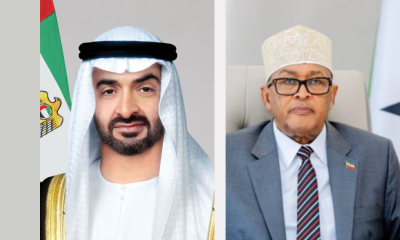
 Somaliland1 year ago
Somaliland1 year agoSomaliland and UAE Elevate Ties to Comprehensive Strategic Partnership


